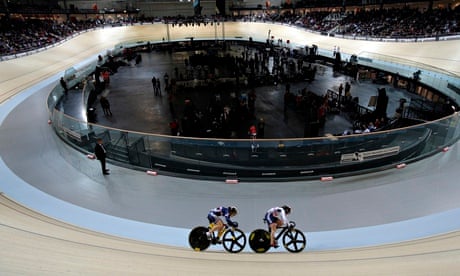One of the abiding memories of the London Olympics in 2012 was French consternation at the tidal wave of British medal successes in track cycling. There was much Gallic muttering over the alleged use of "special wheels" by the perfidious Britons, deceptive tactics such as Jason Kenny's habit of underperforming between Olympics, and so on. On Thursday evening, however, the French cycling federation unveiled what they hope will be the key to unlocking Britain's dominance in the discipline, a sparkling, €68m velodrome in the outer suburbs of Paris.
Ironically, in view of the fact that from the outside its wood-clad exterior bears more than a passing resemblance to London's "Pringle", the French national velodrome is the only bricks and mortar legacy of Paris's abortive bid to host the Games that were awarded to the British capital. When London won the Games in 2005, the French Cycling Federation picked up the velodrome baton and ran with it.
The goal is that the velodrome will become a centre of excellence to compare with Manchester, where the British track cyclists have honed their skills since Lottery funding began in 1998.
As well as the 250m indoor track designed by the German Ralph Schürmann, – which on Thursday had that lovely fresh-sawn smell unique to new velodromes – the Velodrome National complex includes an Olympic standard BMX track – as does Manchester – plus accommodation for the 20-strong French national track cycling squad and up to eight BMX racers, a 15km road racing circuit and mountain bike tracks. The objective is overt: the French want this place to become a cycling centre of excellence to match Clairefontaine in football and Marcoussis in rugby.
The World Cycling Centre director Fred Magne said: "I think France will go into a new dynamic here. For the trainers, it's a huge advantage to have the athletes all under the same roof. I don't think that it will be enough to beat the British in two or three years, but we will see results in the long term."
It may seem hard to conceive for the nation where cycle racing was born and which boasts the world's greatest cycle race, but France has lacked a world-class indoor velodrome since the demolition in 1959 of Paris's Velodrome d'Hiver, notorious for its use during the second world war as a holding camp for Jewish detainees en route to the concentration camps.
The tracks in Bordeaux and Grenoble do not come up to scratch, while the INSEP velodrome in the Paris suburbs where the French squad have trained up to now is so small in diameter that it becomes dangerous when sprinters such as Gregory Baugé and company hit top speed. It is said that when he met the great French sprint champion Daniel Morelon in the 1960s, President De Gaulle said he would build an indoor velodrome for the nation's sprinters; instead, the project was quietly forgotten until 2003.
The velodrome's launch came less than 48 hours before the Six Nations Le Crunch between Les Bleus and Les Rosbifs at the Stade de France, and appropriately enough for a venue that is inspired by Great Britain, the complex was opened with an exhibition sprint match between France and a GB squad that included the Olympic champion Kenny and the world championship bronze medallist Victoria Williamson.
Fifteen years ago, Great Britain could not muster a medal at a world track championships; on Thursday evening they were invited to lend extra lustre to the opening of the venue the French hope will bring them a golden future.
"Here, we will be able to move forwards," said Francois Pervis, world record holder at the kilometre and flying 200m. "At first glance, we'll get two or three kilometres per hour extra in every sprint. It's a big step forward when it comes to ctaching the British, but we dont' want to just catch them, we have to overtake them."
